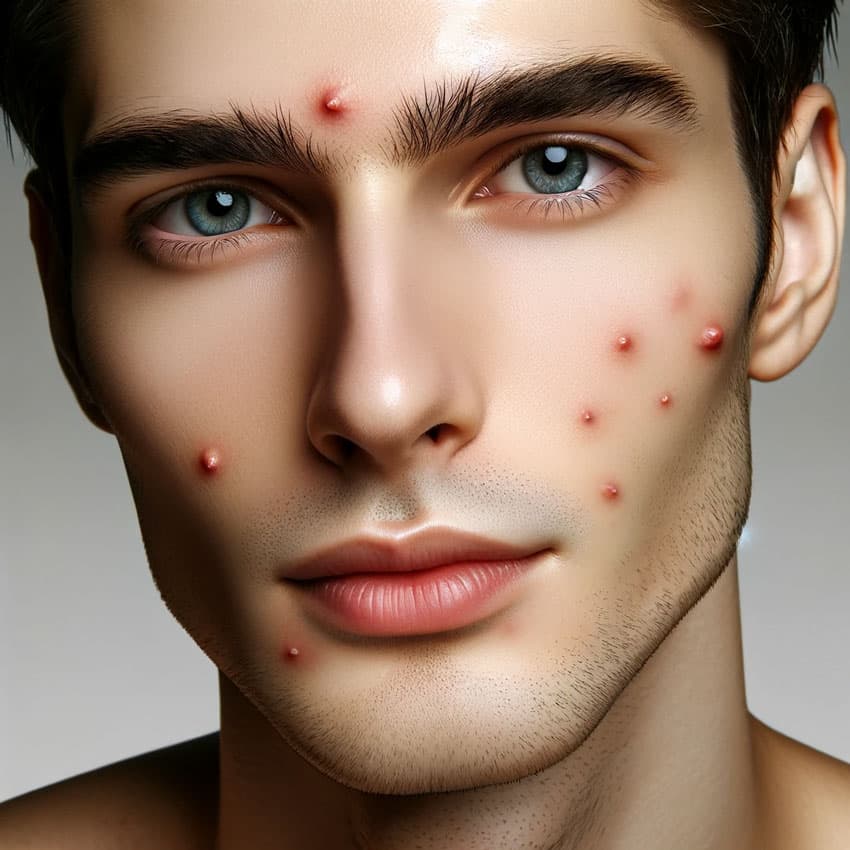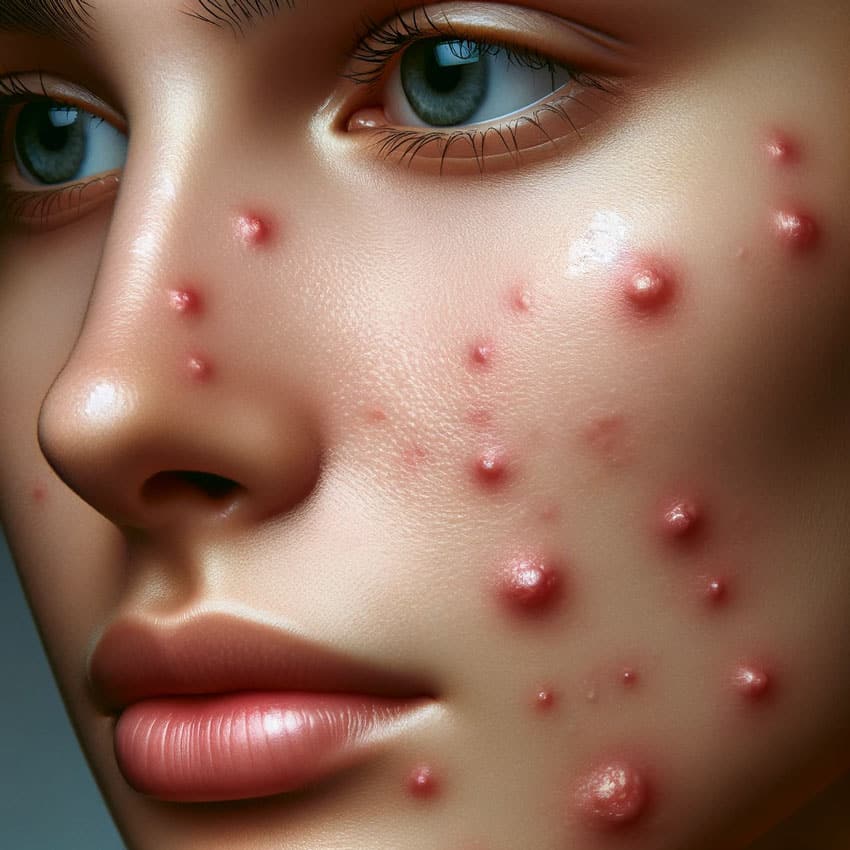Hormonal acne is a common skin condition that affects people of all ages, but it is most prevalent in teenagers and women. It occurs when the body produces excess oil, which clogs the pores and leads to the development of pimples, blackheads, and whiteheads.
Unlike other forms of acne, hormonal acne is caused by hormonal imbalances in the body, which can be triggered by a variety of factors, including puberty, menstruation, pregnancy, and menopause.
Understanding Hormonal Acne
Hormonal acne is a type of acne that is caused by hormonal imbalances in the body. It is more common in women than men, and it often appears during puberty, menstruation, pregnancy, and menopause.
Hormonal acne is caused by the overproduction of sebum, an oily substance in skin glands, which clogs pores and leads to inflammation and pimples.
Hormones play a significant role in the development of hormonal acne. Androgens, such as testosterone, stimulate the production of sebum, which can lead to acne. Estrogen and progesterone, on the other hand, can help regulate sebum production and prevent acne.
Hormonal birth control can also affect hormone levels and sebum production, which can lead to acne.
Puberty is a time when hormonal acne is most likely to occur. During puberty, the body undergoes significant hormonal changes, which can lead to increased sebum production and acne.
Menstruation and ovulation can also cause hormonal imbalances, which can lead to acne flare-ups.
Menopause is another time when hormonal imbalances can occur, leading to hormonal acne. As women age, their estrogen levels decrease, which can lead to increased sebum production and acne. Hormone replacement therapy can help regulate hormone levels and prevent acne in menopausal women.

Causes and Triggers of Hormonal Acne
Hormonal acne is primarily caused by hormonal imbalances in the body, which can lead to the overproduction of sebum, an oily substance in skin glands. This excess oil clogs pores, leading to the formation of pimples, blackheads, and whiteheads.
Hormonal imbalances can be triggered by a variety of factors, including stress, diet, pregnancy, menstruation, sleep, exercise, and insulin.
Stress can be a major trigger for hormonal acne, as it can cause the body to produce more androgens, which stimulate oil production in the skin. Additionally, stress can lead to inflammation, which can exacerbate acne symptoms.
Diet can also play a role in the development of hormonal acne. Foods high in sugar and dairy products have been linked to acne breakouts, as they can increase inflammation and stimulate oil production in the skin.
Eating a diet rich in fruits, vegetables, and whole grains, on the other hand, can help reduce inflammation and promote clearer skin.
Pregnancy and menstruation can also trigger hormonal acne, as hormonal fluctuations during these times can lead to changes in oil production and inflammation in the skin.
Getting enough sleep and regular exercise can help regulate hormones and reduce the risk of acne breakouts.
Finally, insulin resistance can contribute to the development of hormonal acne, as it can lead to increased androgen production and inflammation in the skin. Eating a balanced diet and maintaining a healthy weight can help prevent insulin resistance and reduce the risk of acne breakouts.

Symptoms and Locations of Hormonal Acne
Hormonal acne is characterized by breakouts that occur in specific areas of the body, such as the face, back, chin, cheeks, jawline, neck, chest, shoulders, forehead, and nose.
The symptoms of hormonal acne can vary from person to person but typically include pain, inflammation, blackheads, whiteheads, pimples, cysts, and breakouts. Hormonal acne can also cause redness and irritation in the affected areas of the skin.
While hormonal acne can be frustrating and difficult to treat, there are several treatment options available. Some common treatments for hormonal acne include topical creams, oral medications, and lifestyle changes. It is important to talk to a healthcare provider to determine the best treatment plan for your individual needs.
Treatment and Prevention Methods
Hormonal acne can be treated and prevented through various methods. A dermatologist can help determine the best course of action based on the severity of the acne.
Medications such as oral and topical medications can be used to treat hormonal acne. Retinoids, salicylic acid, benzoyl peroxide, spironolactone, antibiotics, and oral contraceptives are some of the most commonly prescribed medications for hormonal acne.
Chemical peels and light therapy can also be used to treat hormonal acne. Chemical peels work by removing dead skin cells and unclogging pores, while light therapy targets the bacteria that cause acne.
In addition to medication and treatment, certain lifestyle changes can also help prevent hormonal acne.
Eating a diet rich in antioxidants, omega-3 fatty acids, and vitamin A can help reduce inflammation and promote healthy skin.
Supplements such as aloe vera and green tea can also be beneficial for hormonal acne.
Using a moisturizer and sunscreen daily can also help prevent hormonal acne. It is important to use a gentle cleanser to avoid irritating the skin. Antioxidants can also be incorporated into a skincare routine to help prevent acne.

Lifestyle Changes for Managing Hormonal Acne
Managing hormonal acne can be challenging, but incorporating certain lifestyle changes into your routine can help reduce its severity. Here are some ways to manage hormonal acne:
Diet
Diet plays a significant role in hormonal acne. Eating a balanced diet with plenty of fruits, vegetables, and whole grains can help reduce inflammation and balance hormone levels. Avoiding processed foods, sugary drinks, and foods high in saturated fats can also help reduce acne breakouts.
Exercise
Regular exercise can help manage hormonal acne by reducing stress levels and improving blood circulation. Exercise also helps regulate hormone levels and can help prevent acne breakouts.
Sleep
Getting enough sleep is crucial for managing hormonal acne. Lack of sleep can increase stress levels, which can lead to hormonal imbalances and acne breakouts. Aim to get at least 7-8 hours of sleep each night to help regulate hormone levels and reduce acne breakouts.
Stress
Stress is a common trigger for hormonal acne. Incorporating stress-reducing techniques like meditation, yoga, or deep breathing exercises can help manage stress levels and reduce acne breakouts.
Picking
Picking at acne can cause further inflammation and scarring. It’s essential to avoid picking at acne to prevent further breakouts and scarring.
Acne Treatments
Over-the-counter acne treatments containing benzoyl peroxide or salicylic acid can help manage mild to moderate hormonal acne. For severe acne, prescription medications like oral contraceptives, antibiotics, or isotretinoin may be necessary.

